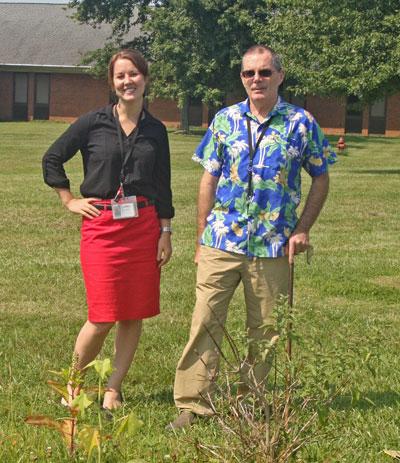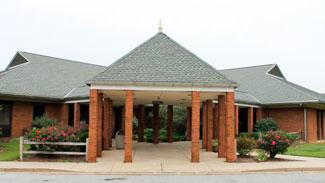
Melissa Stuebing, Primary Counselor at A. F. Whitsitt Crisis Bed and Andrew Pons, Clinical Director of A. F. Whitsitt Center near the proposed site for the new outdoor pavilion.
Kent County Behavioral Health, with its brick facade, multi-gabled roof, and canopied entrance, looks more like a public library than the life-saving facility it has become.
Just northeast of Kent Plaza on Scheeler Road in Chestertown, the complex is home to Upper Shore Mental Health Services, the Carter Center for Adolescent Girls, Recovery in Motion, and the A. F. Whitsitt Center, a volunteer residential treatment and rehabilitation service for people addicted to alcohol and drugs, as well as suffering from mental health disorders.
And things are always busy there.
Its 26-beds, including three in its crisis wing, are at 94 percent capacity with a constant wait-list of between 30 and 40 patients or more at any given time.
Heroin use in Maryland—a 33 percent increase in drug overdose deaths during the first quarter of 2014— is reflected by an upsurge in heroin-related patient admissions at KCBH and is an ongoing critical concern for all counties on the Eastern Shore.
“More than half of our admissions are related to opiate (heroin) use,” says Clinical Director Andrew Pons. “The ongoing heroin problem is magnified by easy availability, low cost, purity of the drug and the fact that using heroin nasally tricks the user into overcoming the stigma of needle use,” he says.
Currently, A.F. Whitsitt runs a 21-day inpatient program which includes detox from drugs and alcohol, intensive discharge planning to maintain sobriety, understanding the disease model of addiction and also can include outpatient services like halfway houses and counseling follow-ups.
“Between 60 and 70 percent of our admissions have mental health issues aside from addiction, “ says Crisis Bed counselor Melissa Stuebing.
A.F. Whitsitt is one of the few inpatient addiction/dual diagnosis facilities on the Eastern Shore and takes referrals from all nine counties. Depression, ADD, bipolarism, along with self-medicating for those symptoms, are part of the diagnostic complexity involved with patient admissions and one of the reasons that mental health treatment have been merging with addiction recovery therapies.
Here, in two parts, Andrew Pons, Medical Director at A. F. Whitsitt Center and Melissa Stuebing, Department of Health and Mental Hygiene (DHMH) Primary Counselor at A.F. Whitsitt Center: Crisis Beds, discuss how the patient services operate from admission to release, the upcoming merging of mental health and addiction dual-diagnosis, addiction treatment, and the ongoing fundraising effort for the outdoor A. F. Whitsitt Center Pavilion Project.
Part 1 is approximately 13 minutes in length.
..



Write a Letter to the Editor on this Article
We encourage readers to offer their point of view on this article by submitting the following form. Editing is sometimes necessary and is done at the discretion of the editorial staff.